HIT CHANNEL EXCLUSIVE INTERVIEW: February 2012. We talked with Harvey Brooks, bass player of Bob Dylan, Miles Davis, The Doors and many other huge artists. Harvey Brooks is a great bassist and a fine person. It’s fantastic to talk with a so experienced musician who has played with numerous legends of 20th century music. He played bass in Bob Dylan’s “Like a Rolling Stone” song and “Highway 61 Revisited” album, Miles Davis’ “Bitches Brew” and “Big Fun” albums, The Doors’ “Soft Parade”, in Monterey Pop Festival with The Electric Flag, “Super Session” ultra-classic album (by Mike Bloomfield/Al Kooper/Stephen Stills), Jimi Hendrix’s live bootleg recordings with Jim Morrison, Buddy Miles and Johnny Winter and countless recordings with John Sebastian, Al Kooper, Richie Havens, John Cale and others. Read below the very interesting things he told us:
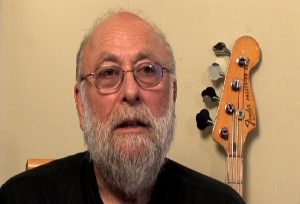 Which are the current projects you are involved in? Are you doing any recordings this period?
Which are the current projects you are involved in? Are you doing any recordings this period?
Yes, I’ve done some sessions in Tel Aviv. I’ve done a trio here in Jerusalem where I live. We’re recording, we’re in a developing stage, we will be doing it in the new future.
In 2009 you took the decision to move to Israel. How is life there? Is there any active jazz scene in Israel?
First of all, both my wife, Bonnie and I, we love being here. We have a daughter who lives here with nine grand-children. As far as jazz scene here, in Tel Aviv and Jerusalem, friends of mine have been coming through, Billy Cobham (drums – Mahavishnu Orcherstra ) and we would say “hello” and come together as they are coming through. There is a wonderful and very alive jazz scene here. The music in Jerusalem is growing very well right now.
Do you miss your early days in 60s New York music scene?
I don’t miss it, but I’ve been glad to have experienced it and been there. We had a wonderful time, creating music and so much of the music done right now, came from what we created in the ‘60s. I’ve done a lot of recording sessions with Bob Dylan, with a lot of New York artists. Folk rock and a lot of pop music right now, came from the things we did back then. As far as missing it, I truly enjoyed doing it and I’m progressing, I’m going forward.
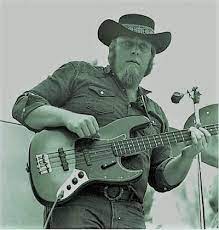 When you recorded “Highway 61 Revisited” album and the song “Like a Rolling Stone” had you realized that these things will be written in music history or you treated to your music as something normal?
When you recorded “Highway 61 Revisited” album and the song “Like a Rolling Stone” had you realized that these things will be written in music history or you treated to your music as something normal?
For me, my friend Al Kooper had called me and said that they needed a bass player in the sessions, so this is my first break in pop music. I really didn’t know who Bob Dylan was. The most exciting part was that I was doing a really good recording session.
How spontaneous was the music of “Super Session”? Did it cοme out from jamming?
I came down from San Francisco with Mike Bloomfield (ed: Bob Dylan’s then guitarist, deceased) in L.A, we were working in the studio and Al Kooper had sketched down some ideas of what music we could possibly do. I would say that half of the album was spontaneous on spot.
How you first came in contact with Miles Davis?
I was a staff producer in Columbia Records and Teo Macero, who was Miles’ producer had the office next to me and when Teo came over me, he said “Miles is doing some sessions down in the studio with his wife, Betty. They want to try out and see if she could get a contract with Columbia and Miles wants to use electric and I recommended you”. So, I went down to the session and I met Miles. On that session was Mitch Mitchell (ed: drums, Jimi Hendrix Experience), Herbie Hancock, John McLaughlin (ed: guitar, Mahavishnu Orchestra) and it was like a demo session for Betty Davis and later, after the session Miles had invited me to play on the “Bitches Brew” album.
All the musicians who played in Miles Davis’ “Bitches Brew” and “Big Fun” are legends. Whose playing impressed you the most?
Well, I would have to say that Miles is the most impressive figure, because not only he is a great player, he’s a great visionary. But everyone was a great player, so I have to say they were all around me, and Miles have to stand down as man.
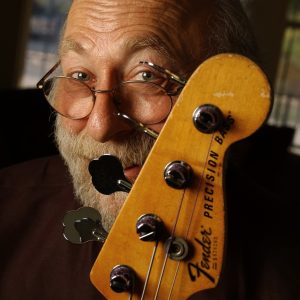 Do you remember any funny, unknown or unexpected story for the recordings of The Doors’ “Soft Parade”?
Do you remember any funny, unknown or unexpected story for the recordings of The Doors’ “Soft Parade”?
That album, at the time The Doors were not very happy. There was a lot of tension and the producer Paul Rothchild was trying to come up with a new direction for them, something that would be good for the fans but also put the band back in a better mental place, which it didn’t work (laughs). Electra had opened up a brand new studio in La Cienega Blvd and we would get there doing the first album at that studio. There are a couple of bass players in that album, they didn’t normally use a bass player, but I had done a bunch of album with Paul Rothchild with John Sebastian (ed: solo, The Lovin’ Spoonful).
John Sebastian told me how great producer Paul Rothchild was. John played the harmonica in “Roadhouse Blues” too. He said that Paul Rothchild always tried to push the artists forward and always tried new things in the studio.
That was what made Paul a great producer and what he was doing with The Doors at the time, was since no one would really want talking to each other during the album. I was coming in the morning, I would wait for the guys to come in, and John (ed: Densmore) the drummer, Ray (ed: Manzarek, keyboards) and Robby Krieger (ed: guitar) they would come in separately and we would work on tunes, I would kind of fit the little sections they had, to put them together. I would connect the sections and then at night, Jim would come in with sing. So, a lot of times I would sit there after the session with the other guys and I had a good relationship with Jim. He could come in and sometimes he ‘d be a little crazy. He was very crazy. I was staying in a hotel and I was just coming out of the hotel to go to the studio. Some of the work, worked really well, some didn’t because Paul always pushing to have hits on the records. He had two hits on that: “Tell All The People” and “Touch Me”.
Now, we can easily judge the album, but then in 1969 it was revolutionary a rock band to have horns, trumpets and all these things.
You know, the guy who did the arrangements for the horns, was a really good friend of mine and a great musician, Paul Harris. He arranged it, I basically arranged the rhythm section with the guys and he arranged the horns from the rhythm section. Some people loved it, some people hated it, but it really broke ground, it was really a different sound for them.
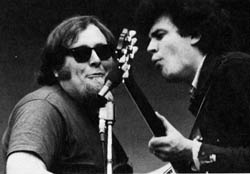 You even performed live with The Doors in L.A Forum and Madison Square Garden. How was that experience? I think you are the only bass player who played with them onstage.
You even performed live with The Doors in L.A Forum and Madison Square Garden. How was that experience? I think you are the only bass player who played with them onstage.
Yes, that’s true. Some people in the audience after the Florida thing (ed: Miami concert on March 1st 1969. For more watch the film “Doors” by Oliver Stone) were very encouraging and some people were very sarcastic, but the place was filled. They really liked it. For me, playing with them, was a lot of fun. I really enjoyed playing with John Densmore. He was really good.
And a great person. I’m the only Greek who has done an interview with Mr Densmore. He loves jazz, he tried to bring African elements in his music.
He talked a lot about jazz. Both of us, are big fans and he, John, is a good man and Robby Krieger is a great songwriter.
John Densmore has said “I always was a jazz drummer but the problem is I haven’t done a jazz album”.
Well, it’s not too late.
He did it! He did “Tribaljazz” in 2006.
I haven’t heard that.
It was very well-received. He even played a gig in Obama campaign in 2008!
Aah, I’m glad to hear that.
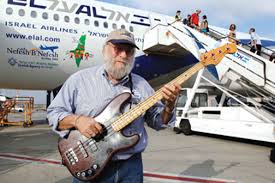 Do you think ‘60s and ‘70s music was more genuine than current music?
Do you think ‘60s and ‘70s music was more genuine than current music?
For me, that was the heart of it. The music now is in a different time and the thoughts are different, so it’s a different world. So, I would say the music now takes a lot from then, but there is a lot of music happening now. I don’t hear to a lot of it, but some of it I think is great. I like that guy, Bruno Mars. I like what he does, he takes some of the old sound, the same with Amy Winehouse. Those artists took what was there and embodied it to what is popular now. That stuff I like a lot.
Have you ever rejected an offer to play with someone and then regretted for it?
My worst experience with a thing like that was after we finished “Bitches Brew” album, Miles invited me to go out and play on the road with him and I declined, because I had some other projects then that I had already set up to do. Sometimes I think it would be interesting to do some things more with Miles, but I didn’t. So, that comes close to regretting something.
Some months ago your old collaborator Clarence Clemons (saxophonist in Bruce Springsteen’s E Street Band) passed away. Were you shocked by his death?
I was. I wasn’t aware that he was in an ill health when that happened. I think I’ve read that some days before his death he had a minor stroke. Clarence was a lot of fun to play with. It’s very sad that he “went”.
What do you remember the most from the period you played together?
I was in a band that he had, The Red Bank Rockers. It was a 10-piece horn band and we did a lot of touring for about a year and a half. He was great. We did a lot of R’n’B standards, we even did a couple of my songs on it.
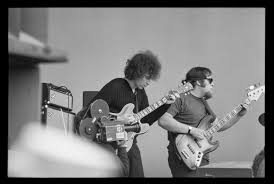 I think Bruce Springsteen sometimes came on stage and played with you in that tour.
I think Bruce Springsteen sometimes came on stage and played with you in that tour.
Yes, yes, we played with Bruce a couple of times. He is fun to play with, he is an open-minded man.
What kind of music are you listening this period?
I’m listening mostly to Charlie Mingus, Thelonious Monk, John Coltrane, Miles Davis. These all are my favourite. I’ve listened to someone like Bruno Mars as I said and I like what he does. There are some good contemporary jazz artists, I can’t remember names.
Keith Jarrett?
Oh, yeah! Absolutely! He’s definitely on the list.
Had you ever met Jimi Hendrix?
Yeah! When I was living in the Village, in the early ‘60s, Jimi was playing as Jimmy James and we used to jam a lot at the Café Au Go Go. In fact, there is a tape with Jimi, myself, I think Paul Butterfield, Johnny Winter, Buddy Miles, I think I was with Jim Morrison on it in some jazz stuff we did.
I think it was at The Scene club.
Yes, at The Scene also. There were two of these recordings (ed: “Woke Up This Morning and Found Myself Dead” the name of one of these bootlegs). Also, I had a record deal for Jimi with Jerry Schoenbaum from Verve Forecast Records and when I talked to him about it, he had just signed with Chas Chandler (ed: The Animals bass player, Hendrix’ manager and producer). He got in England.
Is there anyone you’d like to play with and hasn’t happened yet?
I’m trying to think people I would like to play with. There are a lot of people.
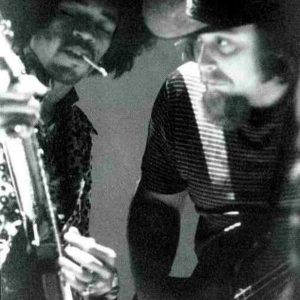 Would you like to play with someone like Jeff Beck?
Would you like to play with someone like Jeff Beck?
Oh, yeah that would be great. There would be a lot of fun to play with Jeff Beck. He’s very comfortable, relaxed and soulful player. I’ve played with so many great guitar players: Mike Bloomfield, B.B. King, John McLaughlin and I’m still playing (laughs).
Do you feel lucky that you have met all those people in your life?
No, no, no! Every day is a new and anything could happen at any time.
Have you ever been to Greece?
No, but I used to play with Nick Gravenites and he always talked about, he talked about Greece a lot. I would like to come to Greece.
Maybe for a masterclass! Hope to meet you soon.
A huge “THANK YOU” to Mr Harvey Brooks.
Please check http://harveybrooks.net

